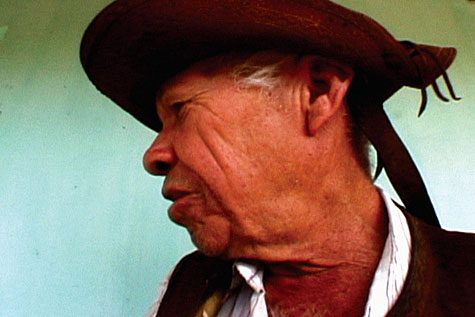
The Mildred Lane Kemper Art Museum at Washington University in St. Louis will present three experimental features exploring relationships between film and visual art as part of its Contemporary Brazilian Film Festival Dec. 7, 8 and 9.
Held in conjunction with the exhibition Rivane Neuenschwander: A Day Like Any Other, the festival will feature screenings of Aboio on Dec. 7, Andarilho (Drifter) on Dec. 8 and Terras (Lands) on Dec. 9.
All three screenings are free and open to the public and begin at 7 p.m. at the Tivoli Theatre, 6350 Delmar Blvd. All films are in Portuguese with English subtitles. The festival was organized with assistance by film researcher João Dumans.
Rivane Neuenschwander: A Day Like Any Other is the first major midcareer survey of work by the Brazilian conceptual artist, whose playful, ephemeral and often participatory art blurs distinctions between author and viewer, object and memory, permanence and temporality.
The exhibition remains on view through Jan. 10, 2011, at the Kemper Art Museum, located near the intersection of Skinker and Forsyth boulevards. Regular hours are 11 a.m. to 6 p.m. Mondays, Wednesdays and Thursdays; 11 a.m. to 8 p.m. Fridays; and 11 a.m. to 6 p.m. Saturdays and Sundays. The museum is closed Tuesdays.
For more information about the film festival or the exhibition, call (314) 935-4523 or visit kemperartmuseum.wustl.edu.
Schedule of Events
7 p.m. Tuesday, Dec. 7
Tivoli Theatre
Aboio (2005)
Directed by Marília Rocha
For centuries, cowboys in the Brazilian outback have employed aboio — a kind of plaintive, wordless song — to communicate with their cattle. Yet today, this largely improvised form is on the verge of extinction. Rocha’s award-winning documentary, at once simple and immersive, explores the age-old phenomenon as well as the lives and imaginations of the cattle drivers for whom it emerges as a form of coded language.
7 p.m. Wednesday, Dec. 8
Tivoli Theatre
Andarilho (Drifter) (2007)
Directed by Cao Guimarães
Between the cities of Montes Claros and Pedra Azul, three lonely drifters follow different paths, each establishing intimate relationships in a transitory world. This second installment in Guimarães’ planned trilogy about solitude continues the director’s daring visual exploration of existential themes. With its breathtaking images of human forms set amidst stunning landscapes, Andarilho captures the relationship between thought and movement, geography and introspection.
7 p.m. Thursday, Dec. 9
Tivoli Theatre
Terras (Land) (2009)
Directed by Maya Da-Rin
The result of three years of research, travel and filming, Terras investigates the convergence of wilderness and urbanization in the remote Amazonian region where Brazil, Colombia and Peru meet. Exploring the lives of urban dwellers in the bustling new cities of Letícia and Tabatinga as well as the indigenous tribes who live in the surrounding rain forest, the film is at once an eye-opening view of cultural difference and a subtle inquiry into the impact of urbanized growth in an ecologically fragile region.
The Mildred Lane Kemper Art Museum
The Mildred Lane Kemper Art Museum, part of Washington University’s Sam Fox School of Design & Visual Arts, is committed to furthering critical thinking and visual literacy through a vital program of exhibitions, publications and accompanying events. The museum dates back to 1881, making it the oldest art museum west of the Mississippi River. Today it boasts one of the finest university collections in the United States.
|
WHO: Mildred Lane Kemper Art Museum WHAT: Contemporary Brazilian Film Festival WHEN: 7 p.m. Dec. 7, 8 and 9 WHERE: Tivoli Theatre, 6350 Delmar Blvd. COST: Free and open to the public INFORMATION: (314) 935-4523 or kemperartmuseum.wustl.edu |